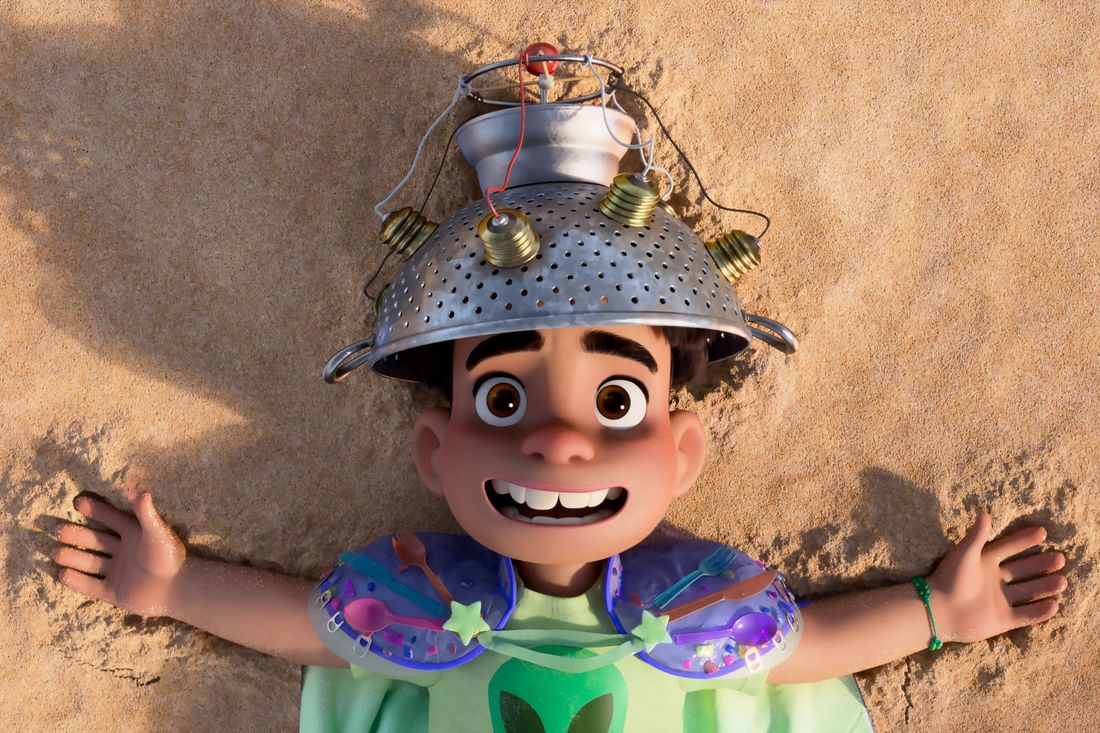
The movie titled Elio revolves around a child living in solitude, yearning for an escape into the cosmos, but ends up getting abducted by aliens who believe he’s Earth’s leader and can argue for our planet to join their federation. Given the imaginative storytelling of Pixar, known for tales like an elderly widow and a Boy Scout in a house lifted by balloons, or love between robots on a desolate post-apocalyptic world, this plot isn’t particularly strange. The film offers enjoyment, with one of its highlights being Glordon (Remy Edgerly), a charming young alien that Elio befriends in his quest to establish himself as an intergalactic ambassador. However, Elio, initially conceived by the writer of Coco, Adrian Molina, and later handed over to directors Domee Shi and Madeline Sharafian, seems disjointed, as if its creators struggled to reconcile its fantastical cosmic politics with its themes of empathy and understanding others’ emotions.
This concept originates from a studio known for investing heavily in its original ideas rather than sequels, yet they seem under pressure to rekindle their past success. My hypothesis is that Pixar might be experiencing performance anxiety when creating movies aimed at boys, which was never an issue for them given their history of titles like Toy Story, Finding Nemo, and Cars, all featuring male characters. However, in recent years, there’s been a slight shift towards stories with more female focus, such as Inside Out, Turning Red, and Elemental. To counter this perceived trend, Pixar produced the Toy Story spinoff, Lightyear, a space adventure that appeared to be deliberately crafted for a specific demographic.
Similarly, Elio seems to grapple with the same issues of calculated planning and overthinking in its story of discontent and otherworldly dreams. The irony lies in the fact that it’s the character of Elio who becomes the film’s main challenge. The creators attempt to evoke empathy for him, but they struggle to fully understand and develop his character.
Elio Solis, portrayed by Yonas Kibreab, has been living with his aunt Olga (Zoe Saldaña) since the passing of his parents some years ago. The pain from this loss has left him disconnected from his new life, resentful towards Olga for her busy military job monitoring space debris, and unwilling to make friends. Instead, he spends his days on the beach longing for extraterrestrials to take him away. Olga, despite her frustration, has set aside her dream of becoming an astronaut to care for Elio. This dream, which Elio views as proof that Olga doesn’t want him around, adds to his feelings of disconnect. The movie struggles to show why Elio feels so isolated and ends up believing that Earth offers him nothing. Despite his difficult behavior, it is evident that Olga cares for him deeply.
In a different rendition, the story constructs a cosmic spectacle to validate his dreams of departure – the Communiverse, a conference where various alien species gather, from the telepathic flatworm (Jameela Jamil) to the rock-like character (Matthias Schweighöfer). These civilizations have banded together in peaceful, technologically advanced unity. The screenplay “Elio,” penned by Julia Cho, Mark Hammer, and Mike Jones, features audio clips from Carl Sagan, reflecting an interest in the concept of not being alone in the universe, but this theme only goes as deep as a metaphor about opening up to others. Although there’s potential in the idea of a troubled child becoming the human race’s ambassador and advocating for our worth in a futuristic interstellar alliance, “Elio” fails to explore this concept. Instead, it follows its protagonist on a mission to negotiate with the aggressive Lord Grigon (Brad Garrett, reminiscent of Emperor Zurg), who threatens war with the Communiverse if his civilization is denied membership. This adventure eventually leads us to Glordon, a charming, merchandise-friendly character, and an appreciation for the softer sides of ruthless warlords and single aunts. However, it also portrays first contact with alien worlds as a validation for a 12-year-old boy – not a giant leap for mankind, but an intricate method to give Elio the choice between staying with Olga or partying in space forever. Despite being a movie about someone discovering, both physically and emotionally, that he’s not alone in the universe, “Elio” struggles to break free from its own confines.
Read More
- 50 Ankle Break & Score Sound ID Codes for Basketball Zero
- Stellar Blade Update 1.011.002 Adds New Boss Fight, Outfits, Photo Mode Improvements
- 50 Goal Sound ID Codes for Blue Lock Rivals
- Stellar Blade x Nikke DLC: Full Walkthrough | How to Beat Scarlet + All Outfit Rewards
- League of Legends: Bilibili Gaming’s Epic Stomp Over Top Esports in LPL 2025 Playoffs
- Complete Steal A Brainrot Beginner’s Guide
- Lucky Offense Tier List & Reroll Guide
- How to use a Modifier in Wuthering Waves
- League of Legends MSI 2025: Full schedule, qualified teams & more
- Ultimate Half Sword Beginners Guide
2025-06-17 19:54